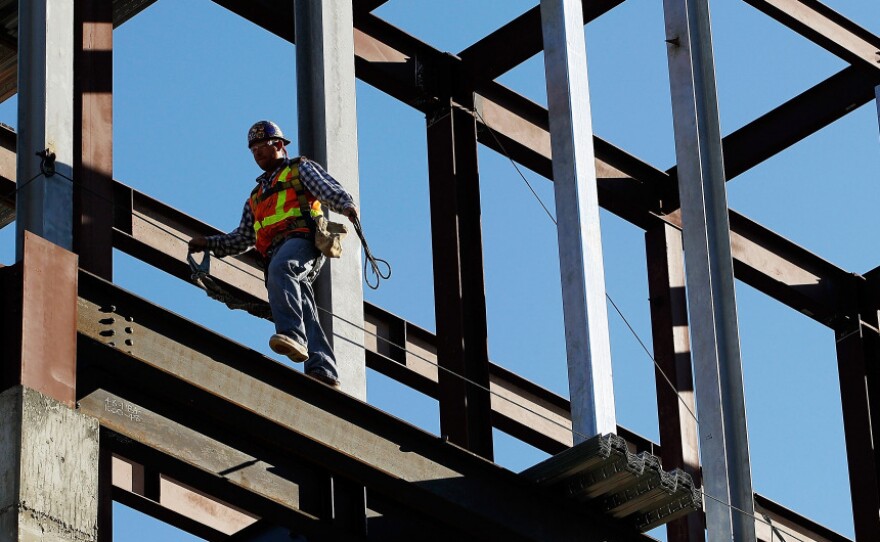A few weeks ago, dismal economic reports seemed to be pointing to one conclusion: The economy was slipping into another recession. Investors fled the stock market, pundits predicted doom and political leaders pointed fingers, trying to fix blame for a faltering economy.
Now, new data suggest the outlook may be somewhat better than many had thought. On Friday, the Labor Department said that last month, employers added 103,000 jobs. The department also revised the July and August numbers upward and noted that the workweek grew a bit longer. The unemployment rate was unchanged at 9.1 percent.
"It is encouraging that despite the shocks in August and September from the debt-ceiling crisis and the eurozone sovereign-debt crisis, job creation is still in positive territory," Nigel Gault, chief U.S. economist for IHS Global Insight, said in a written assessment. "We're not now in recession."
Still, no one is turning cartwheels. Job growth remains far below the level needed to whittle down the unemployment rate to a less painful level.
"The September employment report was a bit better than anticipated," Sen. Bob Casey, D-Pa., said in a statement. But Casey, the chairman of Congress' Joint Economic Committee, added that for the 14 million people who remain out of work in this country, "we have a long way to go."
Republicans blamed the White House for the slow pace of job growth. "Constant threats of tax increases and excessive regulations send the wrong signal to our entrepreneurs, investors and small-business people," said Rep. Eric Cantor, the Virginia Republican who serves as the House majority leader.
Given the intense gloom of August and September, even a mild improvement in the jobs outlook seemed to cheer stock investors, sending the stock market higher. At midday, the Dow Jones industrial average was up nearly 50 points, but it was down later in the afternoon.
Some Positive Signs
These are the Labor Department statistics that encouraged economists and investors:
-- In August, employers added 57,000 jobs; previously the department said no net jobs were created that month.
-- July's job total also was revised upward, to an increase of 127,000 from 85,000.
-- After a long, brutal slump, the construction sector added 26,000 jobs.
-- The workweek got a little longer.
-- Average hourly earnings rose 0.2 percent after dipping in August.
Still Further To Go
In contrast, other statistics show just how much further the job market has to go to heal:
-- The number of people out of work for more than six months rose to 6.2 million, somewhat higher than a year ago.
-- If the Labor Department were to measure unemployment more broadly — counting discouraged workers who have stopped looking and part-timers who want full-time work — the jobless rate would be 16.5 percent. That rate has been rising since the recent low of 15.8 percent in May.
-- The rise in September employment included a one-time boost of about 45,000 Verizon workers who returned to their jobs following an August strike.
The negative factors are not likely to clear up quickly, especially given global concerns about Europe's ability to solve a debt crisis involving a number of countries. Earlier this week, Federal Reserve Chairman Ben Bernanke warned Congress that economic growth was "close to faltering."
A Few Indicators Flashing Green
But a number of business owners and executives continue to see some encouraging signs. For example, consumer confidence has been rising again and in September, sales at retail chain stores moved up. Auto sales rose nearly 10 percent in September to the highest level in five months.
General Electric Chief Executive Officer Jeff Immelt, speaking Thursday at a gathering of about 600 owners of middle-sized businesses, said most executives have come to realize this recovery is moving along, but at a much slower pace than anyone would like.
Speaking at the "Leading from the Middle" conference at Ohio State University, he said "the winners will be people who keep their courage" and continue to hire workers and expand their businesses. "We're going to have to shoot our way out of this one," he said.
Immelt is the chairman of the White House's Council on Jobs and Competitiveness, an advisory group.
Copyright 2022 NPR. To see more, visit https://www.npr.org. 9(MDAzMjM2NDYzMDEyMzc1Njk5NjAxNzY3OQ001))







